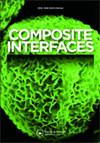水热炭界面厚度对Cf/SiBCN微型复合材料力学性能的影响
IF 2.4
4区 材料科学
Q3 MATERIALS SCIENCE, COMPOSITES
引用次数: 1
摘要
碳纤维/碳氮化硅硼(Cf/SiBCN)微复合材料由于纤维与基体的强结合而表现出较差的力学性能,可以通过引入热液碳(HTC)界面相和优化HTC界面相厚度来进一步改善这一性能。为了研究HTC界面相厚度对Cf/SiBCN微复合材料力学性能的影响,比较了不同HTC界面相厚度Cf/SiBCN微复合材料的拉伸性能。拉伸试验结果表明,引入HTC界面相后,Cf/SiBCN微复合材料的断裂行为由脆性断裂转变为非脆性断裂。此外,Cf/SiBCN微复合材料的抗拉强度和断裂功(WOF)随HTC界面厚度的增加先增大后减小。具有120nm HTC界面相的Cf/SiBCN微复合材料具有最大的抗拉强度和WOF,比无界面相的微复合材料分别提高了约4倍和18倍。本工作表明,HTC界面相的引入有利于提高Cf/SiBCN微型复合材料的拉伸性能,为进一步研究HTC界面相对Cf/SiBCN复合材料力学性能的影响提供了初步的基础。图形抽象本文章由计算机程序翻译,如有差异,请以英文原文为准。
Effect of hydrothermal carbon interphase thickness on mechanical properties of Cf/SiBCN mini-composites
ABSTRACT The carbon fiber/siliconboron carbonitride (Cf/SiBCN) mini-composites exhibit poor mechanical properties due to the strong fiber-matrix bonding, which can be improved by introducing the hydrothermal carbon (HTC) interphase and further engineered by optimizing the HTC interphase thickness. To investigate the effect of the HTC interphase thickness on the mechanical properties of the Cf/SiBCN mini-composites, the tensile properties of the Cf/SiBCN mini-composites with different HTC interphase thicknesses were compared. The tensile test results show that the fracture behavior of the Cf/SiBCN mini-composites changes from brittle fracture to non-brittle fracture after introducing the HTC interphase. In addition, the tensile strength and work of fracture (WOF) of Cf/SiBCN mini-composites first increase and then decrease with the HTC interphase thickness increasing. The corresponding Cf/SiBCN mini-composites with 120 nm HTC interphase exhibits the maximum tensile strength and WOF, which are improved by around 4 times and 18 times, compared with the mini-composites without interphase. This work shows that the introduction of HTC interphase is conducive to improve the tensile properties of the Cf/SiBCN mini-composites, which can provide a preliminary basis for further investigating the effect of HTC interphase on the mechanical properties of the Cf/SiBCN composites. GRAPHICAL ABSTRACT
求助全文
通过发布文献求助,成功后即可免费获取论文全文。
去求助
来源期刊

Composite Interfaces
工程技术-材料科学:复合
CiteScore
5.00
自引率
3.80%
发文量
58
审稿时长
3 months
期刊介绍:
Composite Interfaces publishes interdisciplinary scientific and engineering research articles on composite interfaces/interphases and their related phenomena. Presenting new concepts for the fundamental understanding of composite interface study, the journal balances interest in chemistry, physical properties, mechanical properties, molecular structures, characterization techniques and theories.
Composite Interfaces covers a wide range of topics including - but not restricted to:
-surface treatment of reinforcing fibers and fillers-
effect of interface structure on mechanical properties, physical properties, curing and rheology-
coupling agents-
synthesis of matrices designed to promote adhesion-
molecular and atomic characterization of interfaces-
interfacial morphology-
dynamic mechanical study of interphases-
interfacial compatibilization-
adsorption-
tribology-
composites with organic, inorganic and metallic materials-
composites applied to aerospace, automotive, appliances, electronics, construction, marine, optical and biomedical fields
 求助内容:
求助内容: 应助结果提醒方式:
应助结果提醒方式:


